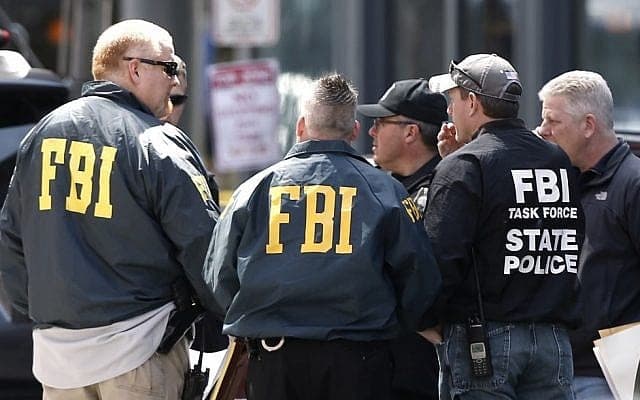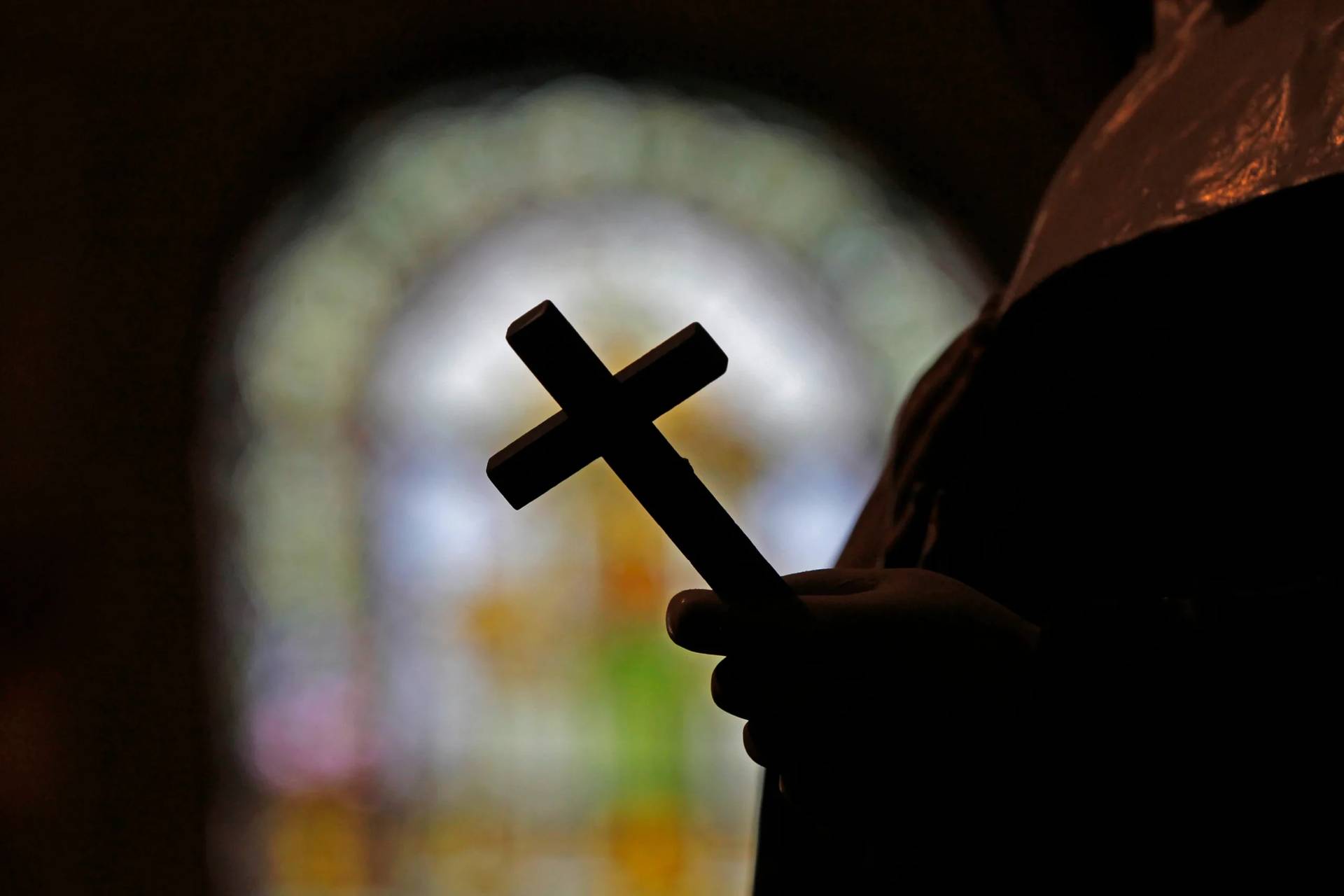NEW YORK – When Monsignor Geno Sylva started as a chaplain for the Federal Bureau of Investigation, his job was described at a training session in a way that stuck with him: that as chaplains, their task is to be “agents for God.”
Though he doesn’t wear a badge or dig into case files, Sylva dons his white priestly collar and black clerical attire when he goes to his office in New York’s Federal Plaza, where he is recognized as someone employees can come to for spiritual and emotional backup, or if they just need someone to talk to.
“Our women and men deal with such intentional evil on a daily basis, so if we as chaplains can represent intentional goodness from God, that’s what we try to do,” Syvla told Crux during a sit-down interview from his New York office.
“We’re not psychiatrists, we’re not psychologists,” but “(we) are agents for God here,” he said, explaining that his day-to-day work can basically be boiled down to four things, the first of which is just being present.
Calling it the “ministry of presence,” Sylva said that when he walks into the Federal Building every Wednesday, which is his one routine day at the office, he visits each squad just to say ‘hi’ and make contact so people can get to know him, and so he can better understand the bureau’s culture.
On an average day, Sylva, who serves as a priest of the Diocese of Paterson in New Jersey and who is rector of the city’s St. John the Baptist cathedral, arrives in New York around 6-6:30 a.m., where he stays in his office for two hours so that people can find him if needed. The rest of the time he spends walking around.
This part of his ministry is key, he said, because “when there is a tragedy you can be there on a deeper level to minister to them …You can’t just drop in there and do ministry if you don’t have relationships beforehand.”
Another two-fold part of his ministry involves getting called in when crisis or emergency situations happen and counselling agents and their families through it, whether it’s a shooting, the death of an agent in the field, or an act of terrorism. Though he just arrived at the New York office in January, Sylva said that while serving a prior assignment in the Newark field office, he had been called out to emergency situations.
“The stress on the men and women in the bureau is incredible,” so the job involves a lot of counseling in order for agents to “have somebody to talk to in confidence that can listen.”
Finally, Sylva said the job also means participating in all the ceremonies held throughout the year, including memorial services for fallen agents. And this, he said, goes for all chaplains, which include not only Catholic priests and Protestant ministers, but also representatives from other faith denominations.
For those who don’t feel comfortable speaking with a religious representative, “trained peers” are available to speak with and listen to anyone who might need the extra support.
“The bureau culture is unique, so having someone that knows their culture, knows the other people, I think makes people feel safe,” Sylva said, explaining that most of what he does is offer encouragement to people and try to help them “see the good and the positive in life through some of the dark things they see on a daily basis, and some of the anxiety.”
“The pressures of the job of keeping people safe, it’s such a noble job and mission they have, so any way that we can help them to keep that joy, keep that faith” is a priority, he said, adding that as a priest of 25 years, being a chaplain for the FBI is “one of the greatest honors of my life.”
The men and women who work at the bureau, he said, “are some of the finest people I’ve ever met in my life. They just want to do good, they want to do right, and they want to keep our country and our world safe, so by me helping in some small way, then I think yeah, maybe we can help the country as well.”
Sylva is one of just 130 FBI chaplains of all faith denominations serving throughout the United States. The bureau first began enlisting chaplains in 1991, and what has now become the Chaplain Program is overseen by the FBI’s Employment Assistance Program (EAP).
Depending on the size of the office, there are typically 2-3 chaplains present in each division. In New York, which is the largest field office, there are six, including Sylva and at least one Jewish rabbi and one Protestant minister. In total, they serve approximately 1,000 agents out of around 13,000 worldwide. Including additional employees, chaplains in New York alone are available to some 2,500 people.
After going through the tedious process of filling out paperwork and undergoing numerous background checks, chaplains are assigned and offered an annual 3-day training.
Before working with the bureau, Sylva was the president of a Catholic high school in Paterson. He first got involved with the FBI during the terrorist attacks Sept. 11, 2001.
For Sylva, how exactly this happened is still a mystery. In his interview with Crux, he said he got a phone call from someone in Port Authority the night of the terrorist attacks, saying two priests were needed at the morgue at Ground Zero. Though to this day he has no idea how his name was put forward, the next morning cars were sent for him and Msgr. Mark Giordani, the then-rector of the Paterson cathedral.
The two were then driven to the morgue, where, according to Sylva, they spent hours “blessing bodies and praying with the responders.”
On his experience that day, Sylva said “I never saw greater evil or greater goodness.” Now, 17 years later, Sylva said he can “still recall the faces of so many of the first responders who risked everything for strangers.”
After that day, Sylva said he was invited to become a chaplain at the Newark office – an offer he initially declined, but later accepted. He served in the Newark division until he was asked in 2012 to go to Rome, where he served a 5-year stint as an English language official for the Pontifical Council for the Promotion of the New Evangelization.
During his time in Rome, Sylva worked with the FBI’s legate office in the U.S. embassy to the Holy See. Shortly before returning to Paterson in January, he was told the FBI could use him as a chaplain in New York, so he again stepped on board after getting back.
Sylva’s re-entrance onto the FBI scene has come as the bureau is facing increased pressure over the ongoing probe into Russia’s involvement in the 2016 U.S. presidential election. With many agents now dealing with illnesses related to being first-responders at the 9/11 attack sites as well, the stress inside the bureau has been on the rise.
So far, in addition to two agents who died in the 9/11 attacks in 2001, 15 more have perished from cancer and other illnesses related to either responding to the attacks or the immediate investigation afterward, when many went on site to collect evidence.
Sylva, who after the interview was due to visit another first responder who had fallen ill at the Sloan Kettering cancer treatment center in New York, said he feels especially close to these people given his own personal experience with the bureau, and on the ground.
“Knowing what he’s been through as a first responder, going to see him, there’s a continuity. Also, having been there (at the Ground Zero morgue) myself, there’s a connection,” he said.
In his view, Sylva said employees “dive into their daily work” and have focused on their cases, doing their best to “keep that outside clamoring and whatever is going on outside to a minimum, because they hold themselves to such a standard in the work that they do.”
“They’re so proud of being a part of the FBI that they always want all that’s good and noble about the bureau to be seen and to be known, so how do we get that face of the bureau out into the culture and to society,” he said, explaining that he has tried to encourage people through the stresses and anxieties.
In the lead up to this year’s anniversary of 9/11, which took place on Tuesday, Sylva said there were a lot of discussions and one-on-one sessions with employees who wanted to talk things out.
A documentary featuring first-hand testimonies was also produced as an educational resource and released internally as a way of immortalizing the events of 2001 for those who now are perhaps out of touch with what happened and what impact it left on those who were there.
Other current initiatives the FBI Chaplain Program is involved with are a Guardian Mass for all law enforcement officials which will take place in New York Oct. 1, and a program called “Casey’s Companions,” which offers support for parents and families who have children that are sick. Launched by the FBI’s Philadelphia office, the program is now being adopted by the New York division.
In his experience, Sylva said he has been impressed at how attentive superiors are to the well-being of their employees in the FBI, especially in New York.
“The care they have for the men and women who work in the bureau, to me it’s inspiring because the people matter to the bureau,” he said, explaining that he often gets calls from busy superiors asking if he can check on someone who seems to be struggling.
The attentiveness, he said, “has been unbelievable. Especially during this time when things are not that easy for us as a bureau, to know that we’re there to care for each other and the families, is really important. And as chaplains we can be a part of that.”
“We’re made to feel that we’re needed as a part of that, we’re not just ceremonial chaplains, which I think is important.”












